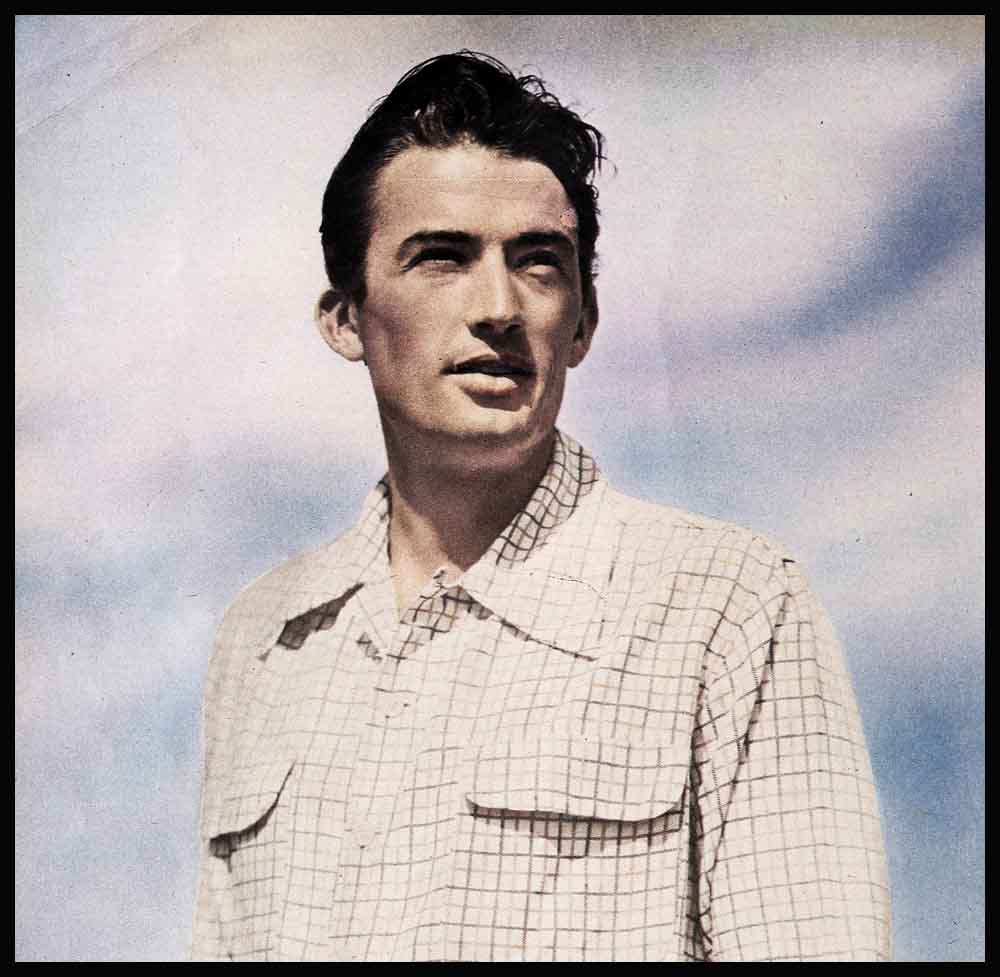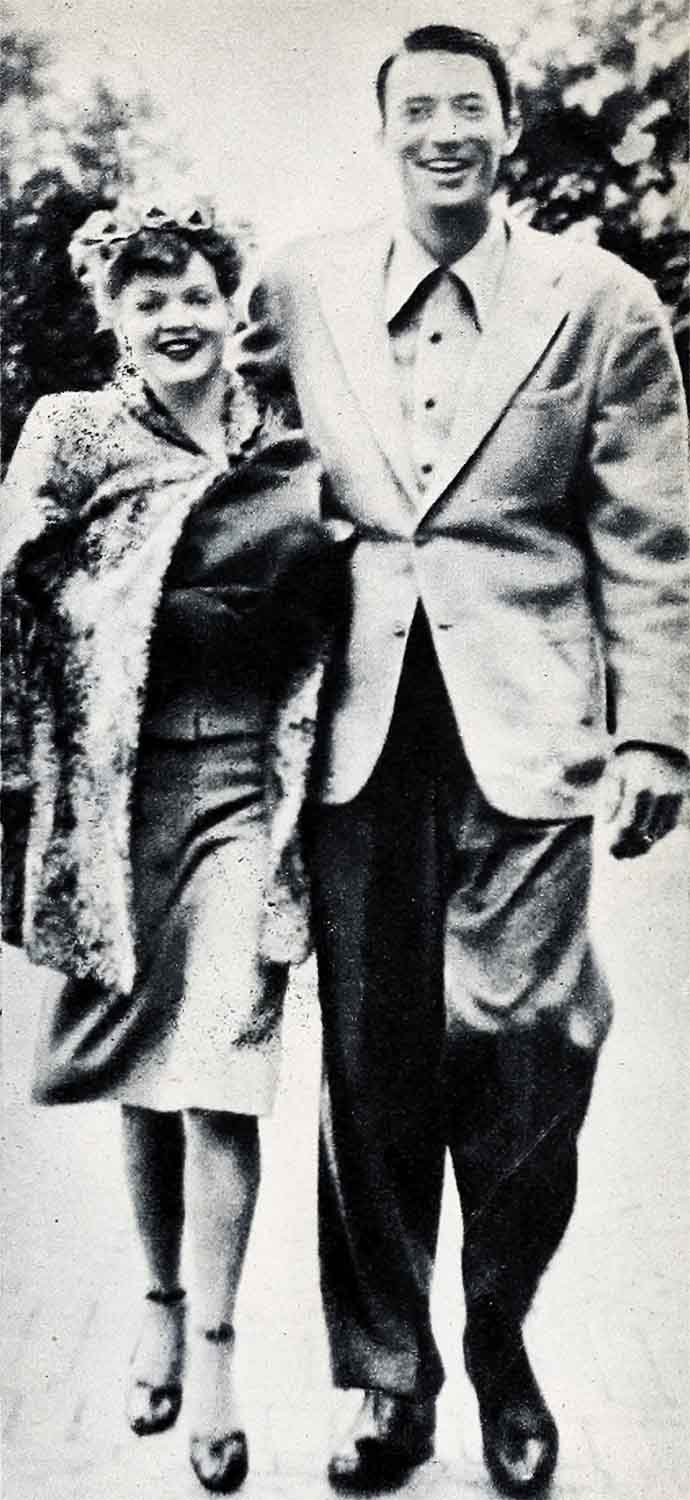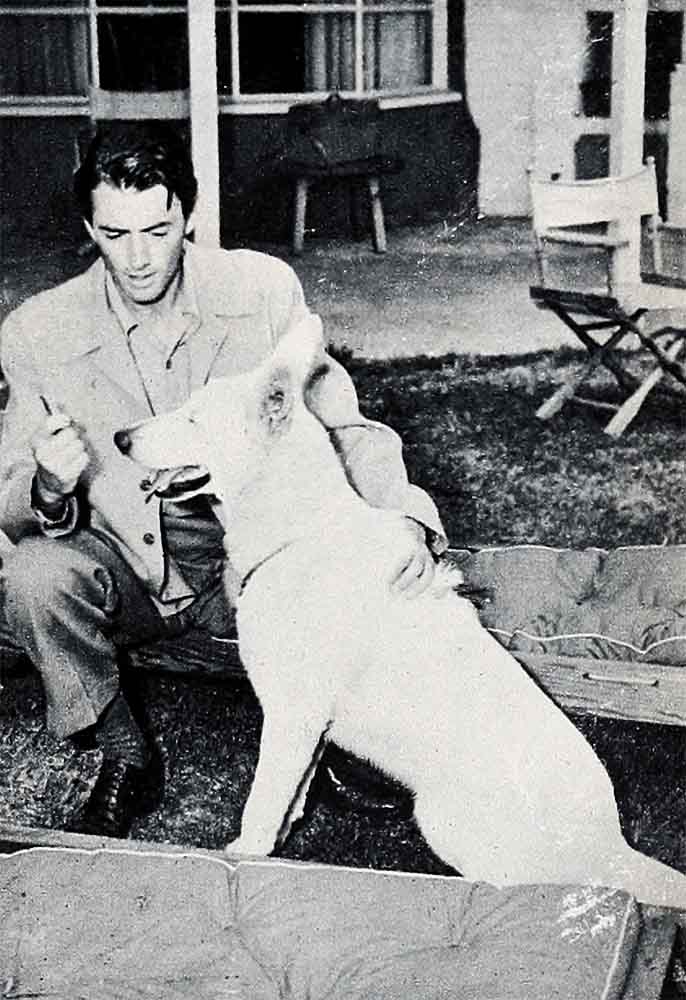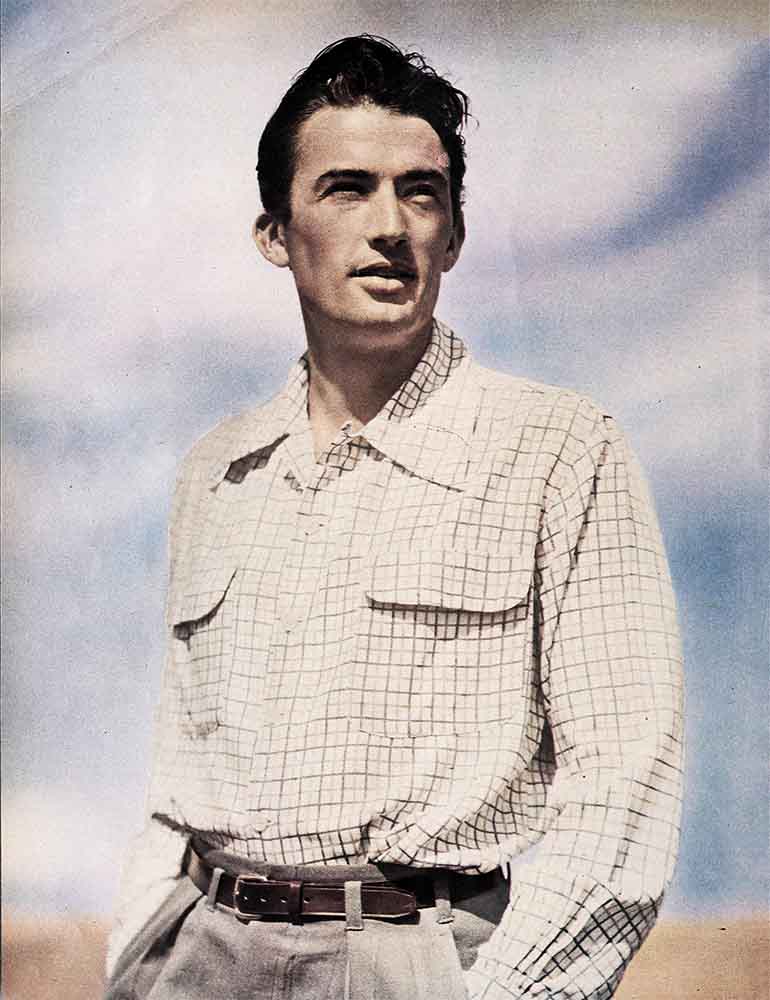
The Key To Gregory Peck
Read this only if yon believe in Fate—for this is a story (a true one) about a tall, dark young man from California who met a small, blonde young woman from Finland. This is how and where and when they met, and it is also their harried adventures before they were married—and their adventures since.
By this time, of course, they live in a charming white house on a cliff overlooking Beverly Hills, in a celebrity-ridden neighborhood.
By this time she has become the mother of a baby boy named Jonathan, and he has become a famous star—the beloved Father Chisholm of “The Keys Of The Kingdom” But things were not always this way, by any means.
Who are the two? Naturally, they are Mr. and Mrs. Gregory Peck. And Mrs. Peck finds herself married to the newest meteor on the Hollywood horizon—the hero of “Days Of Glory,” of “The Keys Of The Kingdom,” and now of “Spellbound,” in which he has a starring role with Ingrid Bergman.
AUDIO BOOK
He is so sought-after that four studios have divided him up as if he were a prize-fighter—he’s owned jointly by David O. Selznick, Twentieth Century-Fox, RKO-Radio and Casey Robinson. Any woman can understand why he’s so in demand—for he’s a slim and graceful six feet three, with almost-black hair, almost-black eyes with a thousand changing expressions in them and a bracing white smile.
But one blonde claimed him three years ago, and the rest of the women might as well stay philosophically in their seats and watch the show.
Not that he seems aware of any of the excitement over him. Every morning he walks into his garage—which is hanging on a cliff’s edge by a triumph of cement over gravity—and inches past a sleek black coupe which he gave to his wife. He then clambers into a rusty 1935 jalopy minus a gasoline indicator, and in this he rattles down the hill and into whichever studio has succeeded in claiming his Services for the time being.
Every night he struggles back up the hill in it again and settles down to training his white police dog, Perry, and to reading current biographical books and then to bed. Sundays the Pecks stay home and welcome friends. Until last spring the welcoming took place on the flagged patio, but now it happens in the living room; because in the big rains the patio descended like an elevator to the bottom of the cliff, 2,000 feet below.
Except for that catastrophe, life has been very peaceful indeed for the Gregory Pecks, recently . . . just as peaceful as it used to be adventurous.
Mr. Peck’s life was always peppered with adventure—though it didn’t become really chaotic until just before Fate introduced him to the future Mrs. Peck. He was born on April 5, 1916, in the pretty little town of La Jolla, California. This was close to San Diego, where his father owned and operated a drugstore . . . and here Gregory attended grammar school and devoted himself to more serious things after school hours, such as boat building. (He fully intended to be another Henry Kaiser in those days.) Then, after he was severely injured in a seagoing venture—the boat went to the bottom and the captain stayed with his ship— he was revived by a capable doctor. (Instantly he decided to be another Mayo.) Both boats and medicine haunted him throughout his subsequent school years at St. Johns Military Academy in Los Angeles, San Diego High School and then the University of California. At California he was just where he started—rowing on the crew, and studying medicine—when he happened into a school play. (You know what he decided immediately without our tipping you off. He decided to become a great actor—and this time he stuck to his plans!)

So the minute he shed his cap and gown following his graduation, he headed eastward toward New York City. (Fate, of course, engineered this, with the blonde from Finland in mind!) When he reached the metropolis of seven million people, he had an introduction to only one man, a business friend of his father’s. However, the friend was instantly useful. He’d just purchased an amusement concession at the World’s Fair and he gave Gregory a job on sight—well, a kind of job! He was barker for a racing automobile that sped around the inside of a huge bowl. But still, it was sort of acting; and it was June of 1939; and Gregory was in New York.
He held it for a month. He made up a spiel and shouted it hoarsely at anyone who came near: “Step this way for a thrilling ride in a death-defying example of cen-trif-i-cal force! Only ten cents—a tenth of a dollar! Ride like a bullet around the rim of a wood-en bowl!” When his voice would trail into a husky whisper, his fellow barker would take up the talk; and when the “pro” collapsed, Gregory would step into his fainting footsteps. But at the end of a month Gregory knew that his voice would be gone for life if he kept it up—so he disappeared into the heart of New York to find another means of support. He found it. He became a guide for Radio City; and this time it was his arches which threatened to leave him for life. Dressed in a blue uniform with a white cap, he conducted groups of tourists through mile after mile of Radio City corridors, each tour taking up an hour while the boy fresh from California told the gaping visitors all about New York.
But this couldn’t go on forever if he wanted to be an actor—or if he were ever to meet the woman in his life, which he was. He tried out for a scholarship to the Neighborhood Playhouse in New York City . . . and won it. At last he was really acting—though of course it was in a dramatic school, not on the professional stage. It gave him superb stock company training for two busy years; and he also put in a summer at the Barter Theater in Virginia. Back again at the Playhouse, he played the lead in “Green Grow The Lilacs” to a full house of talent-scouting Broadway producers—one of whom (Guthrie McClintic) almost vaulted the footlights to offer him a job the coming fail in “The Doctor’s Dilemma,” playing opposite Katharine Cornell. Presto! The amateur was about to become a professional—and at long last Gregory was to meet the blonde.
It happened the opening night of the play, in Philadelphia. As Gregory was waiting in the wings to go on, she came hurrying through the shadows toward him. She was a tiny blonde with creamy skin and wide blue eyes. Not seeing him, she ran into him head-on, and after he’d righted both of them she smiled up at him and introduced herself. ‘I’m Greta Kukonen—it’s Finnish,” she said with the faintest of accents.
“Very interesting—but what are you doing here?” said Gregory, promptly forgetting all about the play.
“Later! There’s your cue!” and she gave him a push toward the stage.

It was as simple as that when it happened. Later he discovered that she was Cornell’s hair-dresser and make-up artist—and meanwhile they had dates wherever the show played, in Pittsburgh, in Boston, in St. Louis, in Chicago. Since she had been with Cornell for two years she knew every town in which ‘they stopped—and she showed Gregory each city and the best restaurants in each one. Between cities, as they sat on trains rumbling across America, they talked and talked and talked. By the time they reached Los Angeles, Gregory was all run out of conversation except for one sentence. It was “Will you marry me?” and he said it.
Only the problem was, how could he afford marriage? The answer was, he couldn’t. He doubly couldn’t a week after he’d proposed, when the play closed. This took place in San Francisco, though he was particularly pleased about it because his family met him there and he was able to introduce them to his future wife, and besides it was Christmas of 1941, and the future held a million promises.
But Fate had temporarily turned her back, so none of them came true. He and Greta went on with Cornell in another play—which closed in eight weeks in Toronto. Next, he opened and closed (in two weeks) in a play called “Punch And Julia”—with everyone wincing. Then it was summer and stock again; and finally it was fail again and another sour play. It was called “The Morning Star” and it ran four weeks to empty houses (but rave reviews for Mr. Peck). Meanwhile, a year had slipped by since Greta and Gregory had first agreed on marriage.
They had spent the year pretending they had money. They saw all the shows—without benefit of tickets. This meant they watched plays only from the second act on—since they tricked their way into the theater by mingling with the crowds in the lobby after Act I, smoking and talking; and then filtering inside with the returning mob. (They are still wondering what the first half of “Gone With The Wind” was like—since they saw that “free” at the Astor Theater, thanks to an intermission!)
They ate well—but never at a restaurant; all dinners were served at Greta’s apartment, which she shared with her very patient brother Paul, who worked in a Chemical company. At first Paul and Gregory weren’t satisfied with the menus there because, true to female Finnish taste, Greta’s idea of a filling dinner was a salad of cottage cheese with tomatoes. But Gregory sized up this unpleasant situation right after he became a star boarder and began tactfully augmenting the meal with packages of meats and other solid foods . . . thus earning Brother Paul’s undying gratitude. Meanwhile, his headquarters were a hall bedroom in a brownstone house—up five flights of rickety stairs.
But at the end of “The Morning Star,” Gregory and Greta went on strike against an absent-minded Fate. They decided half a loaf wasn’t enough. So they spent one Sunday afternoon attending a baseball game, and that night they were married—in the reception room of the Methodist Church, a few steps from the Men’s Room. It was a slightly mad marriage, with strange and sheepish men straggling through the wedding party at intervals throughout the ceremony . . . but regardless of the traffic, the Pecks were wed. They promptly moved into a dingy but wonderful one-room apartment on East 40th Street. It had leaded windows through which they eyed the whole city and its walls were covered in paneling and faded English wallpaper. They were very happy—and right here Fate rediscovered them and made them even happier.
Fate’s new move came after another flop play, “The Willow And I,” via a telephone call from Gregory’s agent—just as simply done as their initial introduction. The agent just called and said unbelievably magic words to the ear of a penniless actor: “Say, Greg, why don’t you and your wife take a trip to Hollywood and look into movie offers?” Pause—then the punch-line: “And charge the trip to me!”
This glorious shock almost killed Gregory; but the minute he recovered from it Greta quit her job for good and she and Gregory packed their bags in a delirious daze and flew to Hollywood. They stayed in style at the Beverly Hills Hotel, staring fascinated at palm trees and blue swimming pools in the middle of February . . . and Gregory signed his four-way contract with every studio he encountered.

Fate tossed them another bouquet. RKO-Radio presented him with a fat bonus for signing the contract! And the Pecks rushed breathlessly to a dude ranch near Phoenix and spent it all! “At twenty dollars a day!” they kept chanting to each other. Then they were ready for Gregory to do one last play on Broadway, “Sons And Soldiers” with Geraldine Fitzgerald— and they finally appeared in Hollywood to settle down to caviar and the cinema. all was very, very well with the Pecks.
And it still is . . . and Fate is still working hard in their behalf. For instance, not knowing any better (after all, they’d never had servants before), they idly dialed an employment agency and asked for a good cook. Jessie arrived two hours later; Jessie being the best cook in Hollywood and an expert pianist on the side. And for another instance, most of their New York friends are in Hollywood too, and invariably they gather on Sundays at the Pecks—the William Princes, the Zachary Scotts, the Matt Willises, and Robert Porterfield. Nights find the Pecks miles away from night clubs, either at home reading or at a theater diligently studying movies. Only one movie has attracted Gregory back for more, though—“Grand Illusion,” which he finally saw four times!
For comic strips he likes the famous trio, “Dick Tracy,” “Terry And The Pirates” and “Li’l Abner,” for clothes he likes the New York uniform of conservative suits, white shirts and plain ties. But in food he becomes a bit more exotic. He is hardly awake before he downs a raw egg in a glass of sherry. Then comes a short interval during which he gets dressed and puts away breakfast—three courses’ worth! At lunch-time he’s an average eater; but by dinner he’s ready for pounds of charcoal-broiled meats (done by himself outside the kitchen door, with no sauces) and desserts from every country’s cookbooks in the world. He also gardens, meanwhile wearing his dilapidated crew cap from college days; and worries over the fact that his dog Perry loves in vain the Persian cat Widgie, and talks endlessly to his wife and baby son.
And that, so far, is the last chapter in the story of the dark young man and the blonde . . . with the happiest of endings to their series of adventures. They’ll be even happier in times to come—why not? Fate is leaning heavily in their direction, every hour of the day!
THE END
It is a quote. PHOTOPLAY MAGAZINE APRIL 1945
AUDIO BOOK




